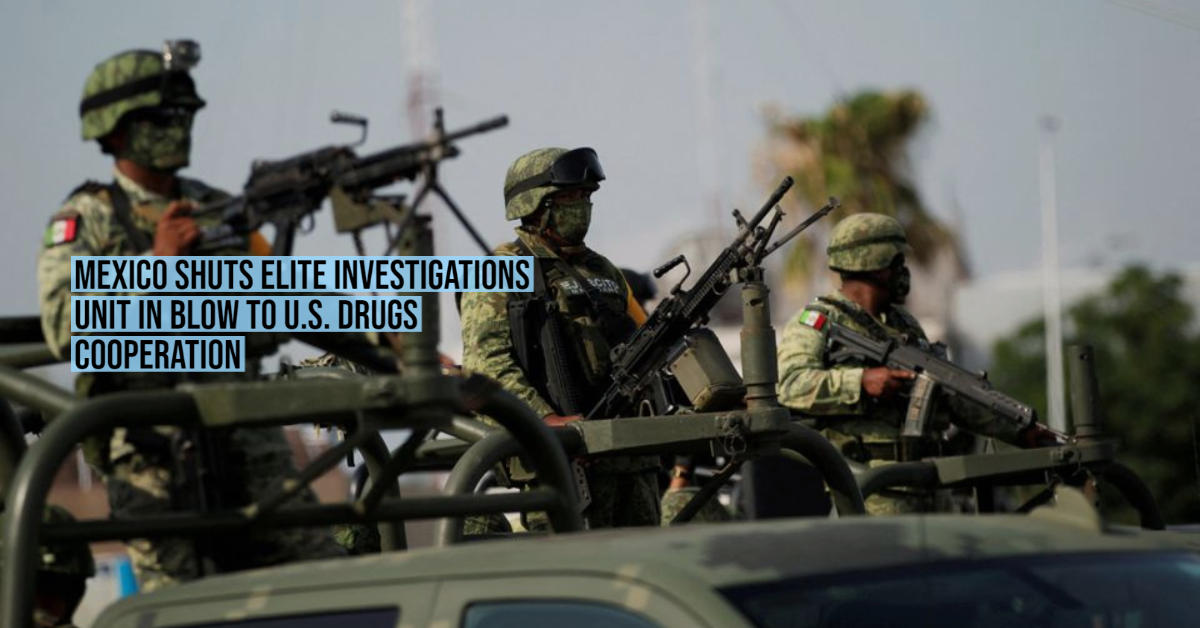Mexico has disbanded a select anti-narcotics unit that for a quarter of a century worked hand-in-hand with the U.S. Drug Enforcement Administration (DEA) to tackle organized crime, two sources said, in a major blow to bilateral security cooperation.
The group was one of the Sensitive Investigative Units (SIU) operating in about 15 countries which U.S. officials tout as invaluable in dismantling powerful smuggling rings and busting countless drug lords around the globe. The units are trained by the DEA but under the control of national governments.
In Mexico, the over 50 officers in the SIU police unit were considered many of the country’s best and worked on the biggest cases such as the 2016 capture of Joaquin “El Chapo” Guzman, then the boss of the powerful Sinaloa cartel.
The closure threatens to imperil U.S. efforts to combat organized crime groups inside Mexico, one of the epicenters of the multi-billion dollar global narcotics trade, and make it harder to catch and prosecute cartel leaders.
President Andres Manuel Lopez Obrador’s government formally notified the DEA in April last year that the unit had been shut down, according to a DEA agent with knowledge of the matter who declined to be named as they were not authorized to speak about the issue. A second source familiar with the situation confirmed the closure of the unit.
Mexico’s Public Security Ministry did not respond to repeated requests for comment. The DEA declined to comment. The closure of the unit was not reported before. Reuters was unable to find out why the Mexican government did not announce it publicly at the time.
“They strangled it,” the agent said, referring to the unit. “It shatters the bridges we spent decades putting together.”
The closure could prove costly on U.S. streets, where authorities are battling to reduce a surge in overdoses that last year led to more than 100,000 deaths mostly linked to a new wave of synthetic drugs produced by Mexican cartels.
The elite team, founded in 1997, was the main conduit for the DEA to share leads on drugs shipments and tips obtained on U.S. soil with Mexico’s government.
The DEA would fly new Mexican entrants to its state-of-the-art facility in Quantico, Virginia, to train them on latest surveillance and policing techniques. U.S. officials also vetted them, including with polygraph tests.
A second Mexican SIU unit, based inside the Attorney General’s Office and independent of Lopez Obrador’s government, continues to operate.
For Mike Vigil, the DEA’s former chief of international operations, the SIU closure and Lopez Obrador’s curbing of security cooperation will hurt both countries.
“It will mean more drugs going to the United States and more violence in Mexico,” he said.
The SIU’s closure is the latest example of the breakdown in cooperation between the DEA and Mexico since Lopez Obrador assumed power in 2018 and vowed to overhaul the country’s security policy.
Angered by the soaring bloodshed he blamed on the heavy-handed tactics of his predecessors, Lopez Obrador sought to implement a less confrontational policing style and pledged to tackle what he claims are the root causes of the violence, such as poverty, instead of hunting down cartel chiefs.
The president also made it harder for foreign security officials to operate inside Mexico, rebuking the DEA over its modus operandi which he said equated to trampling on Mexico’s sovereignty.
Privately, U.S. officials say Mexico’s vital role in blocking the flow of migrants from Latin America – a priority for Washington – leaves them with limited leverage to pressure Lopez Obrador on other issues, such as security cooperation.
Though the SIU’s reputation was damaged when its former chief, Ivan Reyes Arzate, was detained in 2017 and pleaded guilty in a U.S. court to taking bribes to leak tips to a drug gang, the unit was seen as vital by DEA officials who needed Mexican officers to help their investigations in the country.
Alarm bells for the future of the unit rang in 2019, when Lopez Obrador mothballed the Federal Police – inside which the SIU was based – to create a new force called the National Guard.
DEA agents kept working with Mexican counterparts for a while, especially in Mexico City’s airport where SIU officers were intercepting smuggled fentanyl, a hyper-potent synthetic drug blamed for soaring overdoses in the United States.
But security cooperation between the DEA and Mexico plummeted to a fresh low in Oct. 2020 when U.S. security officials in Los Angeles detained Mexico’s former defense minister Salvador Cienfuegos, alleging he colluded with a drug cartel.
U.S. prosecutors swiftly released Cienfuegos, citing “sensitive” foreign policy considerations, but Lopez Obrador accused the DEA of having “little professionalism” and of fabricating evidence in the case.
In Dec. 2020, Lopez Obrador’s government stripped foreign agents of diplomatic immunity and forced Mexican officials to write reports on interactions with security officers from abroad.
“That was the nail in the coffin,” the DEA agent said. Months later the SIU was shut down.
By the time the unit was formally wound up, it had, according to the DEA agent, already been inoperative for some time as Mexico’s National Guard prioritized the deterrence of violence over investigations of drug cartels.
But with more than 33,000 homicides recorded in Mexico last year, Vigil, the ex-DEA agent, said closing an elite unit that goes after organized crime groups responsible for most of the murders doesn’t make sense.
“Mexico is shooting itself in the foot,” he said.
Mexico has disbanded a select anti-narcotics unit that for a quarter of a century worked hand-in-hand with the U.S. Drug . . .












